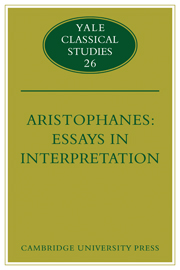Aristophanes and Socrates on learning practical wisdom
Published online by Cambridge University Press: 10 January 2011
Summary
‘Well then,’ said I, ‘when a man of this kind is met by the question, “What is the honorable?” and on his giving the answer which he learned from the lawgiver, the argument confutes him (exelenchēi), and by many and various refutations (pollakis kai pollachēi elenchōn) upsets his faith and makes him believe that this thing is no more honorable than it is base, and when he has had the same experience about the just and the good and everything that he chiefly held in esteem, how do you suppose that he will conduct himself thereafter in the matter of respect and obedience to this traditional morality?’
‘It is inevitable,’ he said, ‘that he will not continue to honor and obey as before.’
Plato, Republic 538d–e (tr. P. Shorey)Two conceptions of moral and civic education confronted each other in the Athens of the late fifth century, competing for the allegiance of parents and young men. On one side (observes the Stranger from Elea in Plato's Sophist) was
the time-honored (archaioprepes), traditional (patrion) way, which men used to adopt with their sons, and still do adopt very often. It consists partly in anger and partly in a gentler sort of exhortation, and the best name for it as a whole is admonition (nouthetētikēn).
On the other is the claim of the expert: moral education is useless unless it is guided by a precise practical skill, akin to scientific knowledge.
- Type
- Chapter
- Information
- Aristophanes: Essays in Interpretation , pp. 43 - 98Publisher: Cambridge University PressPrint publication year: 1981
- 4
- Cited by



